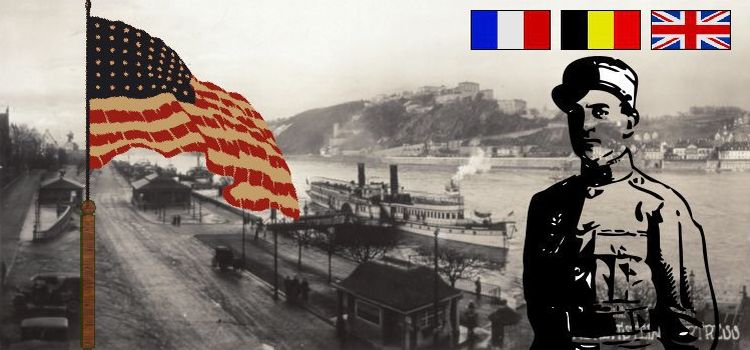
[Rhineland, 1920] The putsch and the Ruhr crisis were over. It had been days of tension for the American Forces, too, as Reichswehr troops marched into the Ruhr area, That contravened the Treaty of Versailles.
French troops had occupied Frankfurt, Hanau and Darmstadt.
Seen from the American side
When news spread about the putsch in Berlin, General Allen had been asked to send trains, to get Americans desiring to leave out of Berlin and Leipzig. It had to happen fast as the German Government would not guarantee their safety.
The Kapp government had annulled the minutes and the Constitution of the Weimar Assembly. Chiara was angry and did not trust them at all. In her heart, she was by Kathi’s and Max’ side, demonstrating against the putsch. Then there was the uprising in the Ruhr area, bloodily suppressed by Reichswehr and Free Corps troops. She had feared with Kathi for Max. Obviously, Germany was far from being a stable democracy in peace. Extremists from the Left and the Right struggled to overthrow the government, which in turn had lost credibility among its own people by giving right-wing troops a free hand.
Chiara did not believe in many officers’ openness for peace, she thought they were just waiting for their time to come. And they did not see that things could be a lot worse for Germany. T
Disagreements among the Allies
On May 19, 1920, Major General Allen was appointed as the American observer on the Rhineland High Commission. His mission to the Rhineland had become not only a military, but also a political one. For all his sympathy and compassion for France, Allen thought that French General Foch “might have lost sight of the general welfare for the coming years”, and that his “military attitude” to hold Germany down for years was wrong. For Allen, “team-work between the Allies was crucial, a great value to the world and to France in particular, that neither English nor American troops leave the Rhine now.”*
However, suspicion and disagreements among the Allies grew. Paul Tirard, the French president of the Rhineland Commission, often complained that England and the USA were not giving his country the support it needed and deserved after all that France had suffered.
The American Forces in Germany were contributing to rebuilt Europe, Chiara thought, whereas some of their Allies seemed at a war after the war. “The Allies were demanding 810,000 milk cows from Germany, while the United States were spending large sums of money toward feeding the undernourished children in Germany. “General Allen is right,” she thought, “the world is still askew, and its various states are working at cross-purposes.”*
Winter 1920
At Christmas, Chiara and John met again with their German family. Chiara loved the coats Helene had made from uniform cloth. A ray of sunshine after a year of violence, putsches and attempted murders. Who knew what the next year would bring? Besides, the Allies were still negotiating the amount of reparations imposed on Germany.
“You know about the devastation in France, don’t you?” Chiara asked. “Entire regions have been blasted into oblivion.” “Yes”, Kathi answered very sadly. “Papa told us about France, and Uncle Joscha about Belgium. We pray that one day we will reconcile with France and Belgium.” “I’m afraid the right-wing hardliners bear mortal hatred against democratic politicians who think so, who seek understanding”, her husband Max added. “There have been two attempts to murder Erzberger, thank God they failed.
You know what Hindenburg and Ludendorff say that the German army was defeated by a ‘stab in the back’. Now the republicans have to pay for defeat, occupation, and reparations. If we do manage soon to get our country back on its feet, the evil seed will sprout.” Kathi nodded. “It may sound weird to put one’s hopes on foreign troops in one’s country, yet I do hope that the American Forces will remain in Germany until the worst is behind us. You can mediate between hard stances and find a pragmatic solution.”
John nodded. “I think Major General Allen would quite agree. He has the deepest sympathies for France and understands its fears. Germany is an overwhelming neighbor, its population is a lot bigger than France’s, and now that entire regions are devastated, France is thrown back economically for years. Therefore, France wants to hold Germany down for years to come. But that will only sow new hatred. Europe can only get back on its feet and thrive again, if we have peace at the Rhine.”
226 billion gold marks
In January 1921, the Allied Powers came together in Paris and established the reparation sum at 226 billion gold marks. The Germans were outraged, Chancellor Fehrenbach and his cabinet declared that Germany could neither accept nor pay that amount.
France wanted to punish Germany for all the devastation caused during the war, and so hard that it would not be a treat to France for many years to come. The hardliners like Poincaré still thought that the Versailles Peace Treaty was too lenient on Germany. In case Germany would not pay the reparations required, the Allies could go for sanctions and occupy German territories, and France could occupy the left bank of the Rhine, make the Rhine the border between France and Germany and control the industrial Ruhr area.
Negotiations in London
The Allies and Germany met by the end of March in London. Germany had to either accept the Allies’ demands or make counter-proposals within for days. The German Government offered 30 billions, which together with 20 billion gold marks already paid would make in total 50 billion. It was by far not enough. To put up pressure on Germany, the Allies occupied Düsseldorf, Duisburg and Ruhrort on March 8.
In Germany, a week-long government crisis followed. The Communist Party saw a good chance to overthrow the government and incited strikes and unrest, Polish militias invaded German Upper Silesia. The Fehrenbach cabinet resigned on May 4, 1921.
London Schedule of Payments
On May 5, the Allies finally quantified their reparations at 132 billion gold marks. This “London Schedule of Payments” was a compromise between what the damaged countries deserved and what Germany could pay. Considering the sum already paid between 1919 and 1921, Germany’s immediate obligation was 41 billion gold marks.
It was an ultimatum. Germany had to accept within a few days, otherwise the entire Ruhr area would be occupied. The new chancellor Joseph Wirth of the Center Party so no other way but accept. On May 11, 1921, the Reichstag passed the London Schedule of Payments.

Be the first to comment